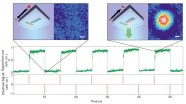(Press-News.org) Research suggests intoxicated victims of sexual assault could accurately retain information from events
Findings are being applied to develop National Guidelines for how the police could interview sexual assault victims who were intoxicated during the crime
Challenges misconception that intoxicated victims and witnesses are unreliable
People are often concerned about the accuracy of testimony given by victims who were intoxicated during a sexual assault- but a new study by University of Leicester researchers has found that while alcohol intoxicated participants report fewer pieces of information about an assault, the information that they do provide is just as accurate as sober participants.
The research suggests that victims of sexual assault who were intoxicated during the crime can still report accurate information when interviewed by the police despite being intoxicated at the time of the offense.
The paper entitled 'Alcohol and remembering a hypothetical sexual assault: Can people who were under the influence of alcohol during the event provide accurate testimony?', published in the journal Memory, is one of the first studies to use a placebo controlled trial that investigates the effects of alcohol on memory within the context of sexual assault.
The team examined the influence of alcohol on remembering an interactive hypothetical sexual assault scenario in a laboratory setting using a balanced placebo design.
Female participants completed a memory test 24 hours and four months later.
Participants reported less information - by responding 'don't know' more often to questions - if they were under the influence of alcohol during the scenario than those who were not.
However, the accuracy of the information intoxicated participants reported did not differ compared to sober participants, suggesting intoxicated participants could accurately retain information from the event as well as those who were sober.
Dr Heather Flowe from the University of Leicester's Department of Neuroscience, Psychology and Behaviour who led the project said: "Serious violent offenses often involve intoxicated witnesses and victims. In particular, in sexual assault and rape cases, victims and perpetrators are likely to have been under the influence of alcohol during the crime.
"When a victim is intoxicated during the crime, questions about the accuracy of testimony are raised in the minds of criminal investigators. Out of these concerns, the police might forgo interviewing victims who were intoxicated during the offence. On the other hand, almost always in sexual offences, the victim is the only one who can provide information about the crime to investigators.
"Consequently, it is not likely that a crime will be solved without victim testimony. Bearing this in mind, we wondered whether intoxicated victims take their mental state during the crime into account when rendering their testimony to investigators. If they take into account that their memory has been impaired by alcohol, they should report information only when they believe it is likely to be accurate.
"Accordingly, intoxicated victims should report less information overall, but the accuracy of the information they do report might not be different from sober victims."
Together with the Crown Prosecution Service and Leicestershire Police, the research findings are being applied to develop National Guidelines regarding how the police should interview sexual assault victims who were intoxicated during the crime.
Detective Inspector Reme Gibson from Leicestershire Police's Rape Investigation Unit said: "Working alongside the University has been of huge benefit to our understanding of the effects alcohol has on memory.
"It has been a long held misconception that victims and witnesses who are intoxicated are not able to give as good an account as they would when they are sober. The delays in speaking with victims accounts sometimes for loss of potential evidence, although alcohol is not the only factor that would influence whether or not an Officer would interview a victim.
"I hope these findings better support future investigations, particularly in the sexual violence arena which is already often complex and not without challenges."
The team working on the guidelines also includes University of Leicester researchers Dr Anna Carline (School of Law), Dr Clare Gunby (Department of Criminology), Professor Graham Davies (School of Psychology), Professor Mandy Burton (School of Law), and Professor Vanessa Munro (School of Law).
The British Academy and Leverhulme Trust have funded a series of workshops to develop the National Guidelines.
Dr Flowe added: "It's fantastic to see the University of Leicester and the Police leading on this important topic. We are working to improve the quality of how testimony is gathered from victims."
INFORMATION:
The paper 'Alcohol and remembering a hypothetical sexual assault: Can people who were under the influence of alcohol during the event provide accurate testimony?' published in the journal Memory is available at: http://www.tandfonline.com/doi/full/10.1080/09658211.2015.1064536#.VdLxvvn9zSg
The study was funded by the Economic and Social Research Council (ESRC).
Long considered in relation to malnutrition and humanitarian aid, food security policy should be moving towards a much broader landscape and focusing on regular access to food for a population nearing nine billion towards 2030-2050, while addressing food insecurity for a fraction of communities, according to a JRC foresight report.
Due to a growing population, climate change, limiting expansion of agricultural land and increasing demand of high-energy food input, achieving global food security will be one of the most critical challenges in the coming years. Traditionally ...
This news release is available in German.
Microbes are the oldest and most successful organisms on the planet, and they communicate and interact using chemistry as their language. While research of the past decades has uncovered fascinating insights into the chemical interactions of microorganisms in the laboratory, it remains extremely challenging to understand what happens in the natural environment. One of the key issues is the difficulty to tie the production of particular molecules to individual bacterial cells or at least populations of cells in complex environmental ...
For the first time ever, researchers have succeeded in creating arrangements of colloids - tiny particles suspended in a solution - and, importantly, they have managed to control their motion with high precision and speed. Thanks to this new technique developed by scientists at the University of Zurich, colloidal nanoparticles may play a role in digital technologies of the future. Nanoparticles can be rapidly displaced, require little energy and their small footprint offers large storage capacity - all these attributes make them well suited to new data storage applications ...
In a commentary published in the Aug. 13 issue of JAMA, Johns Hopkins experts say consolidation of hospitals into massive chains threatens healthy competition, reduces patient choice and could drive up medical expenses.
The authors call on the Federal Trade Commission -- the regulatory body overseeing business practices and consumer protection -- to be more vigilant and cautious when hospital systems seek approval to consolidate and to pay particular attention to geographic regions where proposed mergers could create a single dominant hospital system.
"It's really Economics ...
AMES, Iowa - Mothers are often the caregiver when a child is sick, and that motherly instinct doesn't go away when the child is an adult. In fact, mothers provide more support to adult children with a serious health condition than to their other children, according to new research that will be presented at the American Sociological Association 2015 Annual Meeting.
It's a situation that can put older mothers in a vulnerable position, said Megan Gilligan, lead author and assistant professor of human development and family studies at Iowa State University. Gilligan and ...
Researchers from North Carolina State University, Institut Langevin and Paris-Descartes University have conducted a proof-of-concept study that raises the possibility of using ultrasound techniques to detect cervical stiffness changes that indicate an increased risk of preterm labor in pregnant women. While additional work needs to be done, it may ultimately give doctors a new tool for determining when to provide treatment that can prevent preterm birth.
Premature births can mean low birthweights and other medical problems for newborns, but there are steps that doctors ...
An international research team reports results of a three-year study of sediment samples collected offshore from the Fukushima Daiichi Nuclear Power Plant in a new paper published August 18, 2015, in the American Chemical Society's journal, Environmental Science and Technology.
The research aids in understanding what happens to Fukushima contaminants after they are buried on the seafloor off coastal Japan.
Led by Ken Buesseler, a senior scientist and marine chemist at the Woods Hole Oceanographic Institution (WHOI), the team found that a small fraction of contaminated ...
Only 1 in 10 heart failure patients is referred to a cardiac rehabilitation program after being hospitalized, despite strong evidence that such exercise programs improve quality of life and reduce the likelihood of future hospitalizations.
The findings, from a UCLA-led study, appear in the August 25 Journal of the American College of Cardiology. Researchers drew the data from a national database of more than 100,000 people with heart failure who were discharged from hospitals between 2005 and 2014 and were eligible for cardiac rehabilitation programs.
"Although we expected ...
A new class of fascinating technologies -- including optics in computing, telecommunications links and switches, and virtually any other optical component -- could be created simply by configuring a mesh of light-controlling devices known as interferometers. This is similar to the way electronic semiconductors can fashion the wide array of digital technologies we have at our disposal today.
Optical technologies have the potential to greatly reduce the power consumption of computers, speed telecommunications, and enhance the sensitivity of chemical and biological sensors. ...
A national survey of more than 750 emergency medical services providers conducted by researchers at Oregon Health & Science University identified airway management skills, personal anxiety and limited pediatric care proficiency among key factors that may contribute to pediatric safety events for children in out-of-hospital emergent care situations. The study, published online today in The Journal of Pediatrics, supports the American Academy of Pediatrics' recommendation for pediatric physician involvement in EMS training, medical oversight and policy development.
"Pediatric ...



